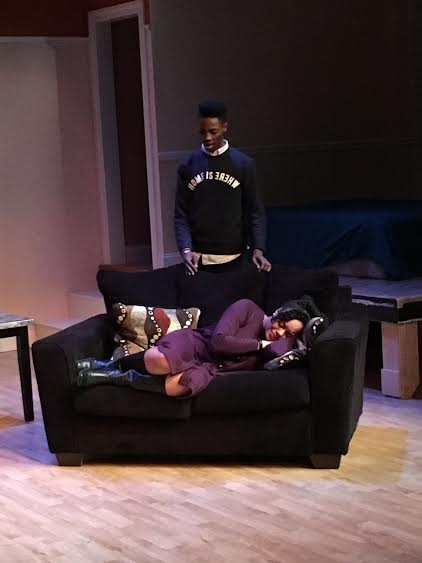
Photo credit: James Pierre
Presented by Hibernian Hall
Directed & Written by Jacqui Parker
November 6 -21, 2015
Hibernian Hall on Facebook
Black Lives Matter
Review by Travis Manni
(Roxbury, MA) The timeliness of Jacqui Parker’s play is not reflective of her knowledge of current events, but rather a sheer necessity in direct response to the fact that we still do not live in a post-racial society. A Crack in the Blue Wall pays tribute to the families of black youth who are being killed because, as poet Claudia Rankine explains in Citizen, white men can’t police their imagination. What surprised me most about the perspective of Parker’s show is the respect she showed for both the families of the deceased as well as the police force, which is too often blanketed as entirely corrupt.
We meet Deltra Brickmore-Crawford (Abria Smith), a successful (as indicted by her well-decorated living room), middle-aged businesswoman, who is mourning the loss of her son, Trey Jr (Seyquan Mack). Over the radio news, we learn through painfully long exposition that the young man was shot while jogging with a hoodie pulled up on the Boston Common by a white police officer. While Deltra is taking pills to cope, her husband, a Boston Police officer (Wyatt Jackson), turns to investigative research, and her son, Diallo (Derek Jackson), spearheads protests.
Diallo gives a speech, demanding a call-to-action among the police force to not remain silent about the injustice of his brother’s death. It isn’t until Act Two when tensions snap. Diallo’s father feels disrespected by his son for leading the charge against the police force while Deltra, a borderline addict, now struggles to regain control as matriarch of her family.
What really hooked me about this play were Deltra’s nighttime hallucinations of Trey Jr., which create a phenomenal emotional depth for the audience as the ghost of the young man dances and sings for his mother to lull her to sleep. It was hauntingly heartbreaking, particularly the emotional apex of the play when Deltra must decided whether or not she will let go of her son, and I wonder at the irony of the actor’s name not being credited in the playbill.
Parker’s intentional perspective of exploring the family dynamic after the death is also refreshing. So often, the deaths of black people are a means to rally in these types of situations, but nobody stops to think about the devastation it causes for the family. After the funeral, Deltra grieves, “I have just buried my son. I have nothing else to offer.”
But while the script is sharp in certain spots, it becomes a bit too overworked in others. At times, the dialogue felt very stiff and unnatural to the point that I didn’t believe it could ever be a real conversation between real people. For example, a college student, no matter how devotedly religious, is not going to call their virginity their “virtue,” especially not half a dozen times in the course of one minute. And though the most riveting part, the second act, was a well-crafted and tense climax, the play’s most glaring struggle is the length. There is an excess of subplots. The romantic relationships that surface between Diallo and Aiyana (Amelia Lumpkin), a close friend of Trey, Jr. who helps organize the protests and write the speeches, as well as with Leslie, daughter of Mr. Brickmore-Crawford’s police partner, were clichéd, inauthentic, and laughable. The romantic dynamics were used as filler to relieve tension, but it felt dishonest to allow the audience to feel comfortable at any point during such a hard-hitting show. Quite frankly, Leslie (Yohanna Perez), who is head over heels in love with Diallo, is a wholly unnecessary character. Her presence, including everything from the dialogue she shared with her father to provide more grueling exposition to her contrived (and unbelievable) obsession with comic book conventions, was a hindrance on the true plot.
I did enjoy the issues and emotional conflicts that Parker explored in A Crack in the Blue Wall. They weren’t always addressed as directly as they could have been due to unwarranted distractions from the play’s focus of racial issues, but I appreciated the out-of-the-box perspective and the respect she managed to show for both sides of this story.
As my friend and I left the venue, discussing the show we’d just sat through, we were greeted by the flashing of blue and red lights on the streets of Dudley Square. A black man stood on the sidewalk as two white police officers searched his car. I gawked. Was this some kind of twisted, real-life theatre that had been organized? Parker says she wrote the play to foster a stronger relationship with the BPD, but I wondered if theatrics could be enough. Could this play make a crack in the blue wall? I thought. Would a crack be enough?
I turned my head from the man across the street and walked away, not knowing the answer.
A Crack in the Blue Wall runs for 2 hours, 15 minutes with an intermission and will have performances on November 20-21. To purchase tickets, click here.
